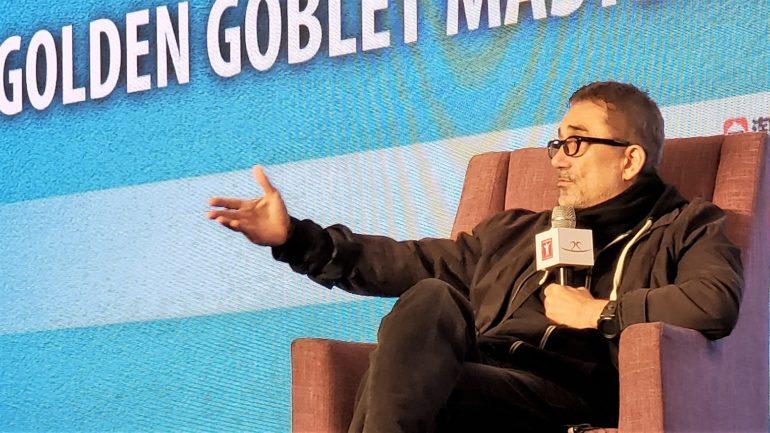Shanghai: How Nuri Bilge Ceylan Sees the World so Differently
By Patrick Frater
LOS ANGELES (Variety.com) – At a masterclass on Thursday, Turkish film director Nuri Bilge Ceylan gave the initial impression of being an austere and unwilling participant. Wearing heavy glasses, keeping his coat on, and responding to questions rather than offering a class, his manner suggested that he was difficult.
In China as the head of the Shanghai International Film Festival’s competition jury, Ceylan also came across as brilliant, learned, insightful, and interestingly self-critical. “I may not be an ideal father (to my two sons),” he said, having recently made a film “The Wild Pear Tree,” in which father-son relationship is central. He also confessed to twice being caught shoplifting cassettes at a time when he lived in London.
But if Ceylan is dogmatic and kleptomaniac, they demonstrate forms of determination that serve his particular, contradictory and dogmatic, film-making process. A process that earned him the Palme d’Or at Cannes in 2014 for “Winter Sleep.”
Ceylan says he works methodically, one movie at a time. But he also values spontaneity. He has largely embraced digital production, and holds no nostalgia for 35mm film. He respects scripts, but truly creates his films in the editing room.
In Ceylan’s world-view, both film production and film viewing are matters of discovery and revelation on one hand, and things unsaid and unseen, on the other.
“Directing is about everything, like being a god. (One) should make the audience active. Hide the truths behind something. Make the audience work,” he said.
Even with a script usually hammered out with himself, his wife and a third party, “I still shoot a lot (of takes). I want a lot of alternatives. I’m always afraid that I lose something and cannot go back,” he said at one point, later revealing that ten takes is an absolute minimum. Upto 40 is normal.
“I shoot a lot of things that are opposite. If the character is to cry, I may shoot them smiling too. We don’t show our insights to the outside world. A careful eye sees more,” he said. “To be sure of something in the filming process is the most dangerous thing. It prevents you from trying different things. What if it doesn’t work (in post-production)?”
The digital era then suits his obsessive style, where three months of production is normal. “35mm (film stock ) is expensive. It was painful for the actor to make a mistake as it cost the production $200 a time,” Ceylan said. “I don’t like nostalgia, grain or tramlines on the image. There is no grain in life. (To me) sound quality is more important than image quality.”
“During production, I’m not involved in the sound at all. I just want the dialog to be clear. Production is the time to focus on the image, it is about actors and mise-en-scene.”
Explaining that sound is built layer-by-layer in post, and that he feels the need to work with foreign sound designers to get the quality he seeks, Ceylan admitted to seeking an auteur’s self-centred version of reality. “I control everything, even the smallest thing. I don’t believe in sound realism. We hear thousands of sounds, but we select what we listen to.”
This kind of detail may come from one of Ceylan’s cinema heroes. “(Robert) Bresson says, ‘if you can tell something with just the sound, you don’t need to show it’.”
Ceylan peppered his conversation with references to auteur greats, who informed his late-life conversion from engineer to photographer and film maker. “Bresson taught me many things. (Yasujiro) Ozu, (Andrei) Tarkovsky, (Michaelangelo) Antonioni are all my teachers.”
“Russian playwright and short story writer, Anton) Checkhov is the biggest influence on my film-making. He taught me how to look at life. I read all his stories several times. For him, every single person is a story, and is different. I came see the world with a kind of Checkhov filter,” Ceylan said. Though Ceylan admitted to being uncomfortable with close literature-to-film transpositions, he confirmed that “” is a loose adaptation of two Checkhov stories.
More modern heroes include Romanian film maker Christi Puiu, Mexico’s Carlos Reygadas and China’s Jia Zhangke. Despite that lofty list, Ceylan insisted that he is not a cinefile. “I just like to watch the kind of movies I like. On the jury I’ll have to watch everything, but normally I need to be directed (to choose) by something,” Ceylan said.
“Unfortunately, I have to watch a lot of Marvel movies, because of my sons. That is my punishment,” he said without a flicker, before adding that age of the viewer makes a difference. “I don’t expect my sons to like my movies at this stage in their lives.”

